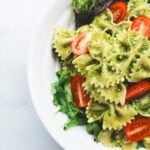Introduction: The Importance of Nutrition for Academic Success
Imagine trying to power a sports car with low-grade fuel. It just wouldn’t perform at its best, right? The same principle applies to our brains, especially for students navigating the demanding landscape of academics. Nutrition plays a pivotal role in how well we think, learn, and retain information. As exams loom and assignments pile up, what you eat can significantly influence your academic success.
With late-night study sessions often leading to poor food choices or skipped meals altogether, it’s time to dive deep into the vital connection between nutrition and brain health. This guide will explore how smart eating habits can enhance cognitive function and support overall learning experiences for students of all ages. Let’s unlock the secrets of nutritional power together!
The Link Between Nutrition and Brain Function
Nutrition plays a crucial role in brain function. The food we consume directly influences our cognitive abilities, mood, and overall mental health.
Certain nutrients are essential for maintaining optimal brain performance. Omega-3 fatty acids found in fish support neural growth and repair. Antioxidants from fruits and vegetables help combat oxidative stress, promoting clearer thinking.
Additionally, carbohydrates provide the brain with glucose—its primary energy source. Whole grains release this energy slowly, ensuring sustained focus throughout the day.
Deficiencies in key vitamins like B12 or D can lead to memory issues and fatigue. Balancing these nutrients is vital for students aiming to excel academically.
Hydration also matters; even mild dehydration can impair concentration and alertness. Drinking enough water enhances both physical performance and cognitive function.
Incorporating a variety of nutrient-rich foods into daily meals creates a solid foundation for academic achievement.
Common Nutritional Deficiencies in Students
Students often face nutritional deficiencies due to busy schedules and poor dietary choices. This can hinder their academic performance.
One common issue is a lack of iron. Many students skip meals or opt for quick snacks, leading to fatigue and difficulty concentrating. Iron-rich foods like spinach, lentils, and lean meats are essential for energy levels.
Another deficiency is vitamin D. With more time spent indoors studying, students may not get enough sunlight exposure. Low vitamin D can impact mood and cognitive function, making it harder to stay engaged in class.
Omega-3 fatty acids are frequently overlooked. These nutrients support brain health and memory but aren’t always included in student diets. Foods such as walnuts, flaxseeds, and fatty fish can help fill this gap.
Addressing these deficiencies early on is vital for sustaining focus and energy throughout the academic year.
Meal Planning for Optimal Brain Health
Meal planning can be a game-changer for students eager to boost their brainpower. A well-structured plan ensures that your meals are rich in nutrients essential for cognitive function.
Start by incorporating whole grains, lean proteins, and plenty of fruits and vegetables into your daily menu. Quinoa, brown rice, chicken, spinach, and berries are all fantastic choices that fuel the brain effectively.
Don’t forget healthy fats! Foods like avocados or nuts provide omega-3 fatty acids crucial for memory retention and focus.
Setting aside time each week to prep meals can save you from last-minute unhealthy options. Try batch cooking soups or stews filled with vitamins—these can be reheated easily on busy days.
Keep hydration in mind. Water plays a vital role in maintaining concentration levels during study sessions or exams. Keep a refillable bottle handy to stay refreshed!
Snack Ideas for Studying and Test-Taking
When it comes to studying or preparing for exams, the right snacks can make a world of difference. First up, consider nuts. A small handful provides healthy fats and protein that fuel brainpower.
Fruits like bananas and berries are also fantastic choices. They’re rich in antioxidants and natural sugars, giving you that quick energy boost without the crash later on.
Greek yogurt topped with granola is another smart option. It’s creamy, delicious, and packed with probiotics for gut health.
Don’t forget about dark chocolate! A few squares can enhance memory retention while satisfying your sweet tooth at the same time.
Whole-grain crackers paired with hummus offer fiber and protein to keep you full during those long study sessions. These snack ideas not only nourish but also keep focus sharp when it matters most.
How to Incorporate Healthy Eating Habits into a Busy Student Lifestyle
Balancing studies, extracurriculars, and social life can make healthy eating a challenge. However, small changes can lead to big results.
Start by prepping meals on weekends. Cook in bulk and store portions for easy access during the week. This reduces the temptation of unhealthy takeout options.
Keep nutritious snacks handy. Nuts, yogurt, and fresh fruits are excellent choices that require minimal effort to grab between classes or study sessions.
Stay hydrated as well. Carry a water bottle everywhere; it’s an easy way to boost energy levels and concentration without any extra calories.
Incorporate quick recipes into your routine. Smoothies packed with spinach, bananas, and protein can be whipped up in minutes for breakfast or lunch on-the-go.
Involve friends in your journey towards healthier eating habits. Share meal ideas or cook together to turn nourishment into a fun activity rather than a chore.
Tips for Parents to Support Their Child’s Nutritional Needs
Parents play a vital role in shaping their child’s eating habits. Start by creating a positive food environment at home. Stock the pantry with nutritious options, like fruits, vegetables, and whole grains.
Encourage family meals whenever possible. Sitting down together not only fosters communication but also allows children to see healthy eating modeled in real-time.
Get kids involved in meal preparation. Allow them to help choose recipes or pick out ingredients at the grocery store. This can spark interest and ownership over what they eat.
Educate about nutrition without overwhelming them. Simple conversations about why certain foods are beneficial can go a long way.
Be patient during this process. Developing healthy habits takes time and persistence is key when fostering their nutritional understanding and choices for life ahead.
Resources for Students to Access
Navigating the world of academics can be challenging, and having access to the right resources makes a significant difference. Students looking to enhance their nutritional knowledge and habits have plenty of options at their fingertips.
Online platforms like MyFitnessPal and Cronometer allow students to track their dietary intake easily. These tools offer insights into macronutrients and vitamins, making it simple to identify any gaps in nutrition. Additionally, many universities provide workshops on nutrition that focus on balancing academic demands with healthy eating.
Cookbooks specifically tailored for busy students are also valuable resources. Titles such as “The Healthy College Cookbook” or “Good Food Fast: 200+ Easy Recipes” cater to those who want nutritious meals without spending hours in the kitchen.
Local community centers often host cooking classes aimed at teaching essential skills while emphasizing quick, healthy recipes. Students can connect with peers through these programs, which fosters both social interaction and learning.
For those seeking professional advice, consulting registered dietitians is an excellent option. Many campuses have health services that include access to dietary professionals who can create personalized plans based on individual needs.
Websites such as ChooseMyPlate.gov provide guidelines for balanced eating along with practical tips for meal planning. This resource emphasizes portion control and encourages incorporating various food groups into daily diets.
With these resources available, students are empowered not only to succeed academically but also take charge of their overall health through proper nutrition strategies tailored just for them.


